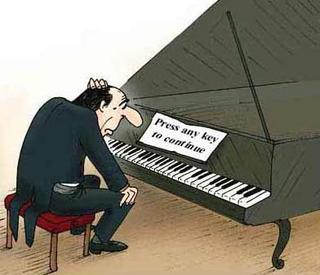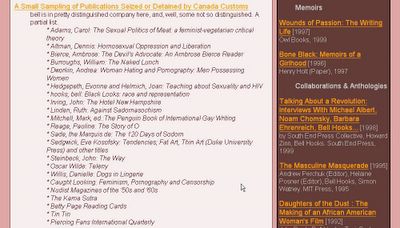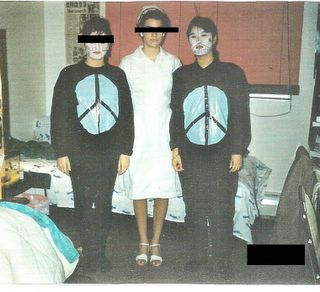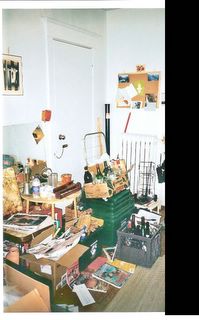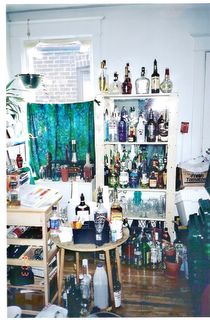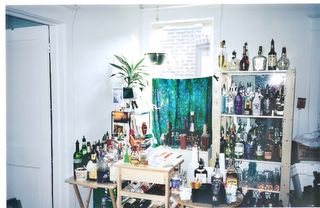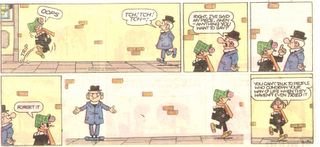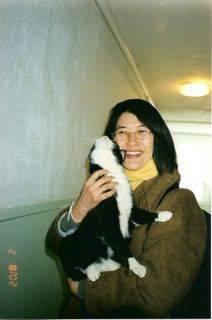(This is long and kind of fuzzy, but oh well...)Too Many Highs and LowsI've hit some pretty serious lows, during these past few years - psychologically, emotionally, and spiritually. I've also come to understand the mentalities of a lot of different people - including the realities they may be facing, how they may think about or perceive things, and so on. Be it the homeless, mentally insane, suicidal, psychotic, or otherwise, socially disenfranchised, I've shared similar head spaces and heartaches with some really *different* folks. Somehow, I managed to hold on to my sanity through it all - but just barely.
(Thank you R. for your abiding love and profound wisdom.)(Prepare yourselves for more self-centred ruminations on my banal past...)Letting Go of Social Masks
My former school days were a high point in my life. I was pretty well-liked (believe it or not), kind of an 'It Girl, With a Unique Twist.' That may sound conceited, but it's true. [1]
I did the usual 'cool things,' although I often added my own brand of social rebellion to such activities - just to be different. I formed a rock band, played various sports, co-ordinated interesting events, won some awards, got asked to the prom by one of the 'It Boys,' etc, etc.
Note: This latter point wasn't a major highlight for me (I had actually asked this cute, stocky Jewish guy from another school to go with me - who was also an 'It Boy,' in his own right, though not stereotypically so) - yet as a self-righteous queer, I often feel the need to clarify that my homosexual desires are *inherent*, not acquired. [2] An overwhelming number of women have bisexual urges. [3] I believe most people are born
bisexual and are socialized into being heteros. [4] [5] Also, for the record, my surveillers like to paint me as being anti-White or a man-hater. Not true! I've been angry, resentful, and antagonistic towards everyone.
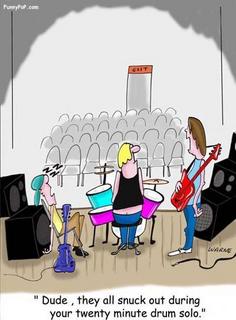
Overall, I was pretty happy to be me - in terms of who I was, and where I was at. In fact, I kind of looked down on those who wanted to be cookie-cutter versions of
someone else. (Hey, I was a teenager - having an *attitude* was part of the territory.) Even back then, I felt many people disrespected their own true essences, wonderful beings, and unique selves by becoming mindless drones or cheap imitations of seemingly glamorous others. Talk about boring! But then, who am I to judge?
Despite the many good times I had enjoyed, I was still somewhat miserable inside. Keeping one's cool, and endeavouring not to be lumped in with anybody else (especially based on race), is hard work. (I was also struggling with school courses, but that's a whole other topic...) Wise words, like Anna Quindlen's
commencement speech at Mount Holyoke College, help one to keep things in perspective. [6]
[Edit: I just reread Quindlen's speech for the first time in a long while, and I'm adding the paragraph, below. Some of my words in this post seem to closely parallel Quindlen's own, yet they sprang from my own thoughts.]Much like Quindlen suggests, I did follow my own path - and I do feel I've developed a rich and vibrant core. Yet, I've also discovered, the long and hard way, that maintaining some personal and social facades IS necessary, at times. [7] Take it from one who knows: having put my *real self* out there way too much and too often (easy bait for predatory types), I have felt betrayed, used, and abused, time and again; and I've become angry, reactive and confused, as a result.
I also deeply grieve what has happened, and is continuing to happen - on an epic scale - partly as a result of my strong antagonisms, outspokenness, and sheer wretchedness, while being under constant surveillance and harassment. I don't regret my ideas - I just feel horrible about how intense I've been about everything.
Doing the Hard Work of HealingI'm now focusing on moving forward. If I can do so with more awareness and sensitivity - while still being true to who I am - I'll consider it a major accomplishment. I guess I don't have much more to say on all this: it's less about words, and more about being and doing.
Thank you for bearing witness to my journey.
-------------------
Notes: [1] I've occasionally bumped into old school friends in my now degraded state. Their respect and appreciation for me has been both touching and painful. It's like being a bag lady, who's suddenly recognized for once holding some respectable position in life. One encounter was particularly poignant. Yet, as I tried to describe the situation to my therapists, they could only see me as who I appear to be, right now. They had little compassion for how big my fall from grace was, or how far my personal experiences have taken me - mentally, emotionally, physically, and spiritually. ('Yeah, you're unemployed, your place is miserable, you're afraid to be out in public, you have no friends, you're broke, you're deeply angry, you're being harassed,
blah, blah, blah... Gee, you sound delusional. Here, take some medication.')
[2] I was fairly well-adjusted growing up. However, I've been a '
tomboy' all my life, and I've been interested in both sexes since an early age. Many people may have
ambivalent feelings about their assigned gender roles. Mine stem from the simple fact that I didn't (and still don't) enjoy most of the 'girly-girl' activities that I was expected to engage in - I wanted to be where the fun, action, and adventures were! This doesn't make me an *abnormal* person (just ask
Mary Cheney): I was simply different.
[3] Queer desire was socially accepted - even expected, and sometimes revered - in many
ancient cultures around
the world. Kanika Goswami's '
Homosexuality and our forefathers' surveys this topic, using a South Asian focus. Androgyny and '
two-spiritedness' were widely accepted in historical Native American culture. Bruce Bagemihl's article, '
Left-Handed Bears & Androgynous Cassowaries,' is interesting.
(Note: I posted the following comment on Wikipedia's 'The History of Sex' page. "* ...Is it possible to use a different picture at the start of this page? I think the connotations of 'sex worker,' in relation to a) 'The History of Sex,' and b) a specific race and culture, can be unnecessarily degrading and detracts from what is an excellent topic and information resource. Not that sex trade shouldn't be honestly explored, but as an opener to the overall topic of sex, I think it can be misleading. Thanks for allowing me to comment.")
[4]
Sigmund Freud pioneered the idea of
ungendered sexual drives in modern psychology, although I disagree with his notion that
homosexuality can never be inborn or hereditary. Some of his theories are dated and reflect his conservative upbringing and social environment (though
he was a cocaine user). Personally, I lean towards
Jungian psychology [edited link].
Alfred Kinsey's research revolutionized the field of human sexuality (see
Kinsey Reports).
[5] Here's an interesting
listserv discussion on polymorphous perversity. I can see where the first person is coming from, though I don't fully agree. Structure, order, and established ways are obviously important, yet I also believe in 'process': creative and uninhibited explorations are sometimes necessary, before better solutions and personal/ social/ cultural growth can be attained.
Organizational learning can help achieve better balances by: a) respecting organizational culture and structures, and b) remaining flexible and responsive to important changes, and doing so in a way that strengthens the whole.
[6] See
books by Anna Quindlen.
[7] My downhill slide, over the past few years, is partly the result of peeling away almost ALL the layers of my social masks, while exploring some pretty 'way out' experiences - both socially and spiritually. Like participating in an eight-hour long
rathayatra (Hindu
religious procession), under a beating hot sun in Delhi - it's quite an experience. This may sound trite, but for years, I was seeking some higher purpose or meaning to life. Yet I now realize that: a) there are no definitive answers and trying to find any could drive a person insane (literally), and b)
social masks and personal ego are necessary for sheer survival in society. The challenge now is resocializing myself, while staying as true as I possibly can to my overall learning, growth, and experiences.
